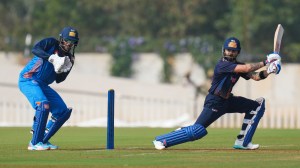Natural Solution
Dr Bhushan Patwardhan,vice chancellor of Symbiosis International University,on how evidence-based Ayurveda can redefine healthcare
Dr Bhushan Patwardhan,vice chancellor of Symbiosis International University,on how evidence-based Ayurveda can redefine healthcare
Scientific research on Ayurveda has come a long way,especially over the last five decades. Dr Bhushan Patwardhan,vice chancellor of Symbiosis International University,whose overview of a journey of a basic scientist into evidence-based Ayurveda has recently been reported in Current Science, suggests that a holistic gestalt and reductionist mechanisms are mutually complementary. However,such complementarity needs paradigm-shifting new research approaches.
Patwardhan,former head of the inter-disciplinary school of health sciences at University of Pune,has provided a detailed account of the research journey,including some detours,towards the destination of several innovative projects,evidence-based Ayurveda and global acceptance of integrative medicine in the May 25 issue of the fortnightly journal, Current Science .
Here,he recalls how in 1989,the University of Pune took a major decision to promote evidence-based research in Ayurveda. “This was a forward-looking initiative that led to the establishment of the Interdisciplinary School of Ayurvedic Medicine (ISAM) under the Faculty of Science, says Patwardhan. “In 1993,P V Sukhatme was invited by the University of Pune as distinguished professor,giving me the opportunity to work with him and others,including Banu Coyajee,N S Deodhar,N H Antia,Rajnikant Arole and R K Mutatkar who recognised the value of establishing the Interdisciplinary School of Health Sciences (ISHS),converging modern concepts of public health with ancient systems of health,including Ayurveda and Yoga. Subsequently,ISAM was merged with ISHS and emerged as a pioneering University School addressing issues of health and not limited only to medicine. A major thrust for scientific research on Ayurveda was given by R A Mashelkar through his Golden Triangle and New Millennium Indian Technology Leadership Initiative (NMITLI) which brought CSIR,ICMR and AYUSH institutions together to generate evidence-based Ayurveda.”
The earlier focus on isolating active ingredients from medicinal plants for drug development is now moving more towards scientific understanding of basic physiological concepts and processes outlined in Ayurveda. “We have learned several lessons though, admits Patwardhan,who points out that Ayurveda is not just a herbal medicine,but a science of life with a holistic approach to health and personalised medicine.
“The classical approach of Ayurveda should not be compromised for convenience of existing scientific research methods. Appropriate research methodology and research protocols should be carefully designed,involving experts from Ayurveda and biomedicine. Ayurvedic knowledge,logic,materials,processes,dosage forms,diagnosis,diet,therapeutics and personalised approach should be understood and valued during any pre-clinical and clinical studies,” Patwardhan insists.







